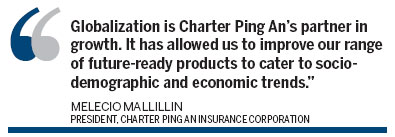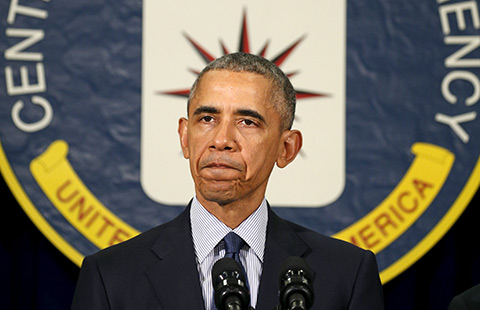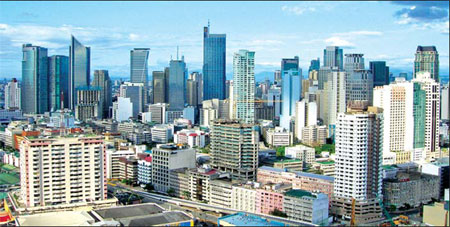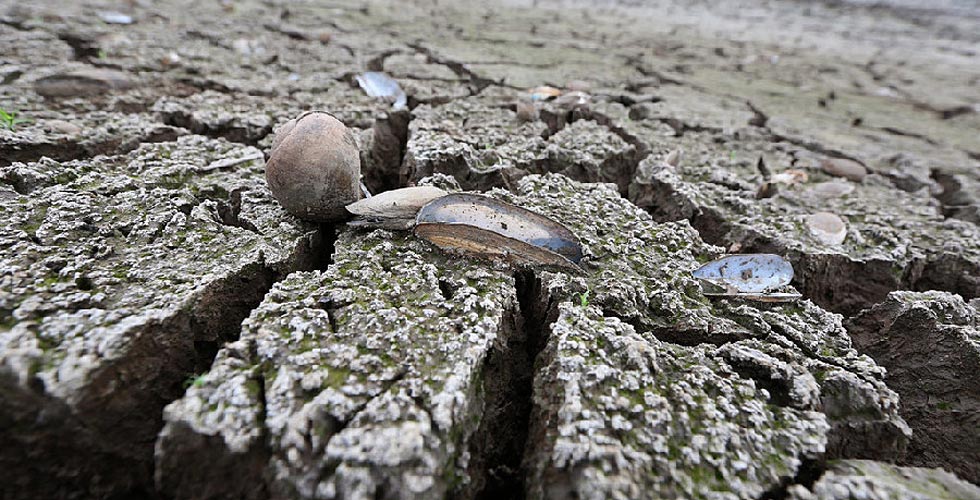Strong economy reassures domestic and foreign investors
Updated: 2012-10-17 07:52
(China Daily)
|
|||||||||||
|
The Philippines is growing in status within the region and beyond. Provided to China Daily |


A positive picture continues to emerge of this dynamic Southeast Asian services hub
With a Fitch credit rating of BB+ and a strong commitment to fighting corruption and tax evasion, the Philippines is fast becoming one of the most exciting investment destinations in the world.
As confidence builds in the country's macroeconomic situation, the Southeast Asian country is proud to be a step closer to attaining its goal of investment-grade credit rating in the soonest time possible.
Competitive and determined, the Philippines is among the best money-per-value destinations in the world. It has a liberalized services industry and is efficient in terms of wages over labor standard expectations and low operational costs, while enjoying an advantageous logistical location within the ASEAN + 3 (Association of Southeast Asian Nations plus China, Japan and South Korea) trading bloc. With strong remittances, the Philippines' gross international reserves are above the world average and it has a vast pool of homegrown talent.
The Philippines benefits from a government committed to establishing a conducive business environment, while the Board of Investment plays a vital go-to role in finding investor management solutions.
The beautiful country, which has a population of 92.2 million, has proved to be resilient in the face of the global financial crisis, due to efforts to control the fiscal deficit, reduce debt ratios, and adopt internationally-accepted banking sector capital adequacy standards.
The banking sector, which makes up 80 percent of the financial system, has also had limited direct exposure to struggling financial institutions overseas, while prudent regulatory policies, including the prohibition of investments in structured products, have shielded the insurance sector.
A proactive member of the ASEAN trading community, the Philippines boasted annual growth averaging 4.6 percent during the first decade of the 21st century and is now keen to forge a higher, sustained economic growth level of around 7 percent to 8 percent per year in order to reduce the poverty that affects about a quarter of the rapidly growing population.
The Philippines' Business Process Outsourcing (BPO) industry currently accounts for about 15 percent of the global market. The industry grew by 40 percent between 2007 and 2009, when the global financial crisis impacted on more sophisticated markets worldwide.
With English as the basic communication medium in business, government and schools, Filipinos are able to deliver a quality service at a significantly competitive cost.
Highly trainable and adaptable, and with competitive technical skills, the local labor force has a strong competitive advantage in the region, especially in industries such as manufacturing, electronics, outsourcing and offshoring.
The country's insurance sector has also emerged as an industry with strong potential for sustained growth. A 6 percent to 7 percent rise in gross domestic product, along with greater consumer spending power, strong remittances from the Filipino Diaspora-estimated to be between 9.5 million to 12.5 million people, a stable BPO industry, and a highly liquidized financial system have put investor-confidence at its highest level for years, with the knock-on effect heralding a need for better quality insurance services.
The country's life insurers are particularly confident about the performance forecast for their sector, having correctly predicted double-digit growth in written premiums for the second consecutive year in 2011 due to positive economic indicators and an increased demand for products.
Embracing opportunities
Meanwhile, the non-life insurance segment, broadly divided into general third-party liability insurance, motor insurance, property insurance, and marine, aviation and transit insurance, has also grown exponentially in recent years, thanks to an increased awareness of product and a growing middle class.
Sustainable growth in the sector is expected to be boosted by the country's growing construction and automobile industries, and introduction of micro-insurance, which will address the needs of the low-income population.
Charter Ping An Insurance Corporation, one of the leading non-life insurance providers in the Philippines, is driven by the core values of integrity, excellence, dependability, customer-service and team work.
Charter Ping An is wholly-owned by Metrobank, named the Best Bank in the Philippines for the third consecutive year in the Euromoney Awards for Excellence 2012 following a breakthrough performance last year. In 2011, Metrobank's consolidated net income reached a record $262.9 million, an increase of 31.9 percent on 2010, as the bank capitalized on market opportunities and efforts for organic growth began to show.
Charter Ping An is making powerful strides to meet the demands of globalization, while keeping its clients' investments as safe as possible.
Formerly the Philippine Charter Insurance Corp, which was established in 1960, Charter Ping An Insurance Corp was rebranded this year. "Ping An" is a Mandarin term that means safe and sound, which President Melecio Mallillin has emphasized as the brand promise of Charter Ping An.
"It is not enough to merely gain the trust of clients, but to nurture that trust and ensure that their wealth is in good hands," he said in a recent press statement.
"Globalization is Charter Ping An's partner in growth. It has allowed us to continuously improve our range of future-ready products to cater to the changing socio-demographic and economic trends," he added.
With demographic shifts, medical advancements, urbanization, climate change and catastrophies, globalized capitalism and tax treatments affecting the insurance industry, Mallillin stated that the insurance companies of today need to stay one step ahead of the pack and be ready to adapt to the ever-evolving demands of the market. The forward-thinking Charter Ping An has pledged that the new look organization will continue to provide security, stability and peace of mind to Filipinos while embracing the opportunities an open economy provides.
InFocus provided the story.
(China Daily 10/17/2012 page10)
Hot Topics
Editor's Picks

|

|

|

|

|

|








